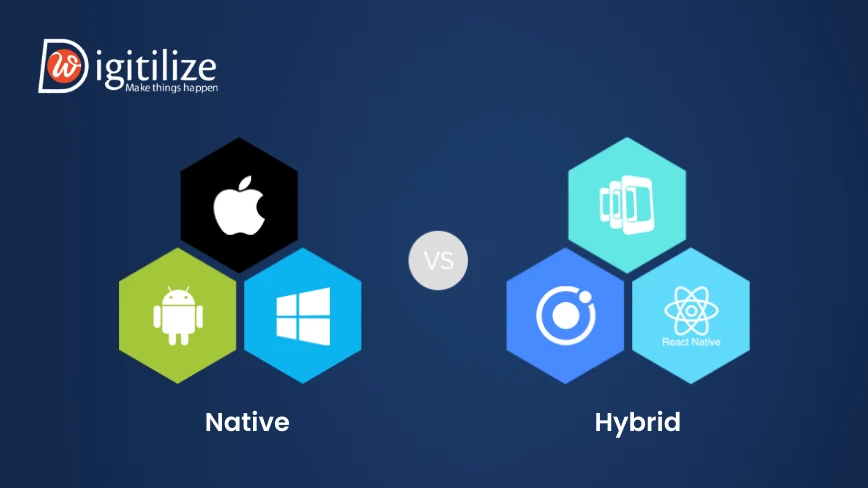Hybrid Mobile App Development vs. Native: What’s Best for Your Project?
 It is not as easy as it would appear to decide whether to invest in creating native vs. hybrid apps UK. It would help if you considered several factors before choosing the best agency.
Factors like your target market, your company’s core competencies, and the features you wish to include in your mobile application.
For this reason, we will discuss the key distinctions between creating a native app and a hybrid app in this post. Additionally, talk about why hybrid apps are succeeding and why UK businesses are choosing them.
It is not as easy as it would appear to decide whether to invest in creating native vs. hybrid apps UK. It would help if you considered several factors before choosing the best agency.
Factors like your target market, your company’s core competencies, and the features you wish to include in your mobile application.
For this reason, we will discuss the key distinctions between creating a native app and a hybrid app in this post. Additionally, talk about why hybrid apps are succeeding and why UK businesses are choosing them.
What Are Hybrid Apps?
Our initial thoughts when considering hybrid app development agency UK always go towards either iOS or Android. However, a hybrid app is a good backup plan. In a nutshell, hybrid apps are programs that operate across many platforms. They are essentially web apps with a native app shell, combining aspects of both web and native applications. Following local deployment, the hybrid software’s shell uses the mobile platform’s features via a browser. The end user cannot see the browser or its plug-ins since they operate on the back end.What are Native apps?
These are applications that are exclusive to a particular operating system. To transfer them to a different operating system, you must make a new version. For instance, Android applications are built in Java, whereas iOS native apps are written in Swift or Objective-C. Among other things, hybrids employ HTML, JavaScript, or CSS. It is important to remember that in this instance, you will want a minimum of two versions of the code: an iOS version and an Android version. This implies a higher outlay of funds than what would be needed to create a hybrid application. This entails the creation and upkeep of two source codes as well as developers who are experts in each platform or operating system.Native vs. Hybrid App Development UK

· User Interface
The application complies with conventional standards and is customize to the specific design criteria. They put UX design into practice for certain operating systems. However, because the program is made to run on different platforms, the user interface and experience design are universal. In this instance, uniformity is more crucial.· The Time of Sale
It will take a lot of time if you intend to create for both platforms. For the particular platform, you must create the interface, build the code, and design the experiences. You will unify the design, produce a single codebase, and distribute it across all platforms. Hybrid apps are cross-compatible so these are effective on browsers as well.· Expertise in Development
To create the platform-specific app, you need mobile developers that are fluent in certain programming languages, such as Swift for iOS. On the other hand, hybrid app development is a good choice for web technology-savvy developers because of its easy deployment. These apps are neither operating system for mobile device-specific. Think about the strategy for hybrid application development. It offers an intriguing solution that carefully balances performance and cost factors. Apps that are hybrid are the best option. when a project must balance performance objectives with financial restrictions without being unduly hampered by strict delivery dates. From the above discussion we can see why UK businesses now prefer hybrid apps. The difference between the native and hybrid apps shows us hybrid apps are more convenient. So, now let’s see how hybrid app benefits for UK businesses.Reasons for Opting Hybrid App Development in the UK

· Cost effective
Cost-effectiveness is a primary factor that drives firms to select hybrid app development. The process of creating distinct native applications for iOS and Android may be costly and time-consuming. On the other hand, hybrid app development lowers total development costs by enabling businesses to produce a single app that functions across several platforms. Hybrid app development is a wise option for startups and small enterprises with tight budgets since it drastically reduces both development and maintenance expenses by utilising a single codebase for all platforms.· Greater Audience
Stunted growth is the result of concentrating only on a particular audience in today’s competitive market. Hybrid app development is helpful in any circumstances. With Android holding a 73 percent market share and iOS holding a 26 per cent share worldwide, the combined share is 99 percent. Thus, using a hybrid approach may enable you to reach a larger audience.· Easy & Scalable Development Stage
Due to its cross-platform app development UK foundation, hybrid mobile apps are not dependent on any one platform. In this case, development would be done just once and applied to several platforms. This will undoubtedly take less time and be a simple task to complete. This won’t require customization for each distinct feature or screen size, in contrast to native programs. It is also easy to manufacture and scale. Here, the frameworks are intelligent enough to reduce development time.· Offline Access: A significant Benefit
People often use the internet for hours at a time. However, they do not use smartphones when they are unable to. But what if the internet connection is not needed for the smart applications to provide the same access? Yes, the hybrid app accurately describes user involvement when there is no internet connection. These applications include online-offline switching capabilities that allow them to operate without internet access.· Seamless Interaction with other Applications
The native approach’s limitation to operating on the same OS is one of its downsides. Hybrid apps, which provide smooth inter-app connectivity, effectively handle this concern. Hybrid app users may interact with different programs smoothly and without interruption. They benefit greatly from this feature while incorporating other features.· Better Market Reach
When it comes to interacting with and comprehending the operating system, hybrid apps are far more sophisticated and well-rounded. This gives developers the freedom to explore creatively and provide concepts that consumers find engaging. The possibilities are endless when coders are allowed creative freedom. As a result, they can reach a wider audience and increase the profitability of their business.Conclusion
DigitilizeWeb is here to clear out the confusion regarding Native vs. Hybrid Mobile App Development. Working with us gives you a competitive advantage in terms of cost-effectiveness and development speed. Our shared codebase approach and hybrid app development frameworks enable you to reach a wider audience on several platforms. Also, this approach lowers development expenses as well. We help you to transform your idea into a valuable product. Don’t wait! Make an appointment for a free meeting with us to learn how app development may help you to succeed. To know more follow us on LinkedIn.FAQ
Frequently Asked Questions
While they are downloaded straight to the device, they function similarly to Web applications. Hybrid applications are created using HTML5, CSS, and JavaScript, just like Web apps.
Similar to hybrid app development, cross-platform app development entails creating applications that utilise a single code base to function on several platforms.
Web-based Security Flaws: Due to their partly web-based nature, hybrid applications are vulnerable to web-based threats such as injection attacks and cross-site scripting (XSS).
A native app for iOS or Android for the native features and mobile devices of the user's location. On the other hand, a hybrid mobile application is not device-specific and is accessible through a variety of browsers. Be aware that not all applications are independent of plugins.
The application runs and shows online content using the WebView technology; however, it lacks the URL bar and other standard browser features.
From a technical perspective, local apps are more feature-rich, easier to maintain, and more scalable. These applications provide a local participation and make use of local components of the device's operating system.

